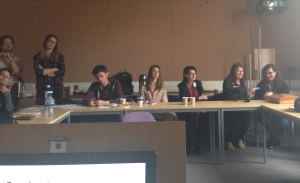The Centre for Urban Resilience and Energy and cities@manchester recently hosted a workshop titled ‘Fuel poverty and energy vulnerability in Europe: New research findings and opportunities’. This event was held at the University of Manchester on the 14th May 2015, and had over 20 attendees taking part. The workshop provided an opportunity for researchers to share emergent work in this field, to discuss potential joint funding applications, and to open a dialogue with decision-makers.

Morning presentations
The workshop opened with a presentation by Professor Gordon Walker (Lancaster University). Professor Walker started by introducing the work being conducted by the DEMAND centre, before discussing what forms of household energy use should be considered necessary aside from heating. Theoretical and empirical evidence was presented in support of including non-heating energy use in conceptualisations of fuel poverty.
The second speaker was Dr Lucie Middlemiss (University of Leeds), who presented a bottom-up characterisation of fuel poverty derived from qualitative research. Six challenges to energy vulnerability were identified as a result of this work, namely: quality of dwelling fabric; energy costs and supply issues; stability of household income; tenancy relations; social relations within the household and outside; and ill health. These six factors were found to play a varying role in making households more or less vulnerable to fuel poverty.
In the next presentation, Professor Stefan Bouzarovski (University of Manchester) posited the concept of energy vulnerability as a planetary scale problem, underpinned by a common condition: the inability to attain a socially- and materially-necessitated level of domestic energy services. In doing so, Professor Bouzarovski argued that we need to move past the affordability-access binary, and consider factors beyond low incomes, high energy prices and poor energy efficiency, such as energy services and needs.
The fourth speaker was Dr Carolyn Snell (University of York), who explored the concept of ‘heat or eat’, which is a high profile concept that has received extensive media attention. Dr Snell provided a brief background on fuel poverty and food poverty/food insecurity, and highlighted that limited evidence exists on the phenomenon of heat or eat. Initial findings were presented from Dr Snell’s ongoing research being conducted in rural England, which uses secondary data analysis, GIS mapping and qualitative interviews.
The final presentation in the morning session was by Dr Jenni Cauvain (University of Nottingham), which focused on energy vulnerability in multiple occupancy housing (HMO). Dr Cauvain noted the importance of HMOs as a housing solution for diverse groups of people, but drew attention to the reduced housing and welfare rights that HMO residents often have, in addition to poor levels of energy efficiency. Dr Cauvain argued that research and policy on fuel poverty and energy efficiency has overlooked HMOs, and offered potential solutions.
Afternoon presentations
After lively debate and discussion over lunch, the afternoon session commenced with a joint presentation by Professor François Bafoil (French National Centre for Scientific Research) and Dr Rachel Guyet (Sciences Po). This presentation compared fuel poverty policies and governance across five European countries (Great Britain, France, Germany, Poland, and Hungary). Professor Bafoil and Dr Guyet found that the Europeanization process is weak in the field of energy access, and that the actions carried out by public authorities are embedded in their path dependent governance.
The seventh speaker of the day was Harriet Thomson (University of York), who explored fuel poverty trends across the European Union using a newly created household-level composite index. Based on the three prevailing indicators from the EU Statistics on Income and Living Conditions, Thomson presented a ranking table of fuel poverty in the EU, finding that Scandinavian countries perform best, whilst Central and Eastern European countries have the highest levels of fuel poverty. Multinomial regression results were also presented.
The eighth presentation came from Dr Saska Petrova (University of Manchester), and was an exploration of energy poverty and alternative economies in Northern Greece. Based on ethnographic research conducted with 25 households in the Thessaloniki area, Dr Petrova reported evidence of widespread energy poverty in urban and peri-urban areas. Furthermore, the research found that lighting practices are an integral part of the rise in energy poverty, and can be used as a coping strategy.
The penultimate presentation by Dr Sergio Tirado Herrero (University of Manchester) looked at energy poverty in Hungary. Dr Tirado Herrero highlighted a number of specific driving forces of energy poverty in Hungary, namely: path dependencies of socialist legacies and post-socialist reforms; dependency on imported natural gas; and the restructuring of the energy sector. The results of expenditure and consensual indicators were also presented, which demonstrated that energy poverty extends across social and spatial strata.
The final presentation was by Professor Christine Liddell (University of Ulster). This talk explored the fuel poverty policies adopted by the devolved administration in Northern Ireland, where over 40% of households are estimated to be in fuel poverty. Professor Liddell outlined the area-based targeting methods used to find areas in extreme fuel poverty, based on GIS mapping. Recent results from a study on the measurement of excess winter deaths were also presented.
Concluding the workshop
The day concluded with two breakout group discussions on developing energy vulnerability indicators, and creating a pan-European research network. The energy vulnerability indicators group reflected on data quality and availability, and whose knowledge is most important to understand energy vulnerability. The discussions considered whether consensual and expenditure indicators can adequately capture the complexities of energy vulnerability and fuel poverty. By comparison, the European research network group discussed the option of submitting a proposal to the next funding round of the European Cooperation in Science and Technology scheme (COST). During the breakout group, the range and focus of COST working groups was considered, and it was decided that CURE would take the lead in coordinating the proposal.
